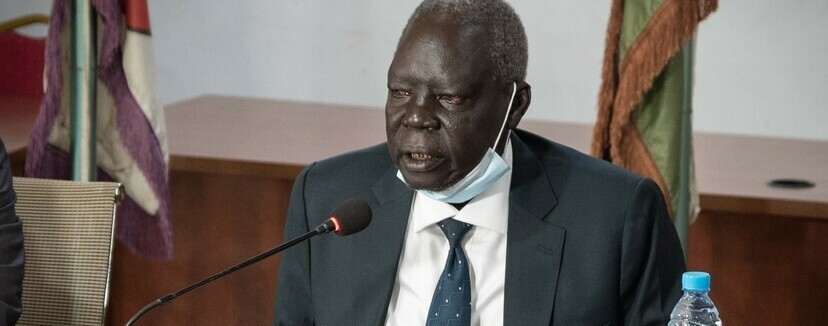South Sudan’s minister of justice tabled the National Elections Act 2012 (Amendment) Bill 2023 and three other Bills before the parliament for debate on Monday.
The other bills include the South Sudan Anti-Corruption Commission Act, 2009 (Amendment) Bill 2023, the National Revenue Authority Act, 2016 (Amendment) Bill 2023, and the Tourism Bill 2023, respectively.
Once the elections Bill is passed into law by the parliament and assented to by the president, the bill, which consists of 12 Chapters, will provide for the reconstitution of a competent and impartial National Elections Commission to conduct general elections as dictated by the 2018 peace agreement.
Addressing the parliament on Monday, Justice Minister Ruben Madol said the elections Bill is crucial as it provides for the conduct of general elections and requirements for the appointment of the chairperson, deputy chairperson and other members of the electoral commission.
“The Amendments also provide for how to deal with vacancies in the commission, termination of members or removal, announcements of the date of elections, meetings of the commission, functions and powers of the chief electoral officer functions and powers of the secretary-general,” he added.
For her part, Jemma Nunu Kumba, the speaker of the transitional legislative assembly, sent the National Elections Act 2012 (Amendment) Bill 2023 to the parliamentary committee for legislation and justice for scrutiny and then to report back within 14 working days.
The speaker, however, urged the parliamentary committee for legislation and justice to speed up its work and make sure to report back in less than two weeks, if possible.
“Now that the budget is coming to the parliament soon, maybe we can consider giving a shorter period to discuss the Bill within at least a week before we table the budget so that we can pass it before the budget,” she said.
However, George Andria Juma, the chairperson of the parliamentary committee for legislation and justice, said considering the importance of the Bill, it has to pass through public hearings and consultations with stakeholders for more input.
“This Bill is a very important bill. Actually, when we are dealing with such bills, there are usually so many stakeholders. At least we need to conduct a public hearing, and also we should have a workshop so that we give more stakeholders to give in their inputs,” Juma said.
Juma underscored that the committee also needs not be rushed to scrutinize the bill to avoid mistakes. “At the end of the day, this work will help the committee to come up with a very good contribution to the bill. That’s why I said one week for us will not be appropriate,” he said.
Meanwhile, Chan Chol Bishop, an MP representing the South Sudan Oppositions Alliance (SSOA) in Upper Nile, said one week is enough to scrutinize the bill, pointing out that as the country is heading towards general elections next year, it is very important to speed up the process.
“For me, I would like to suggest that let’s give the committee one week so that they can work on it, and if they don’t finish, then later they can revert,” Chan said.
South Sudan’s warring sides signed a peace agreement in 2018, establishing a transitional unity government.
President Salva Kiir in December signed the Constitution Making Process Bill, 2022, into law.
According to Chapter 1 (5) of the 2018 peace agreement, the Transitional Government of National Unity (TGoNU) was required to hold general elections to establish a democratically elected government, 60 days before the end of its term.
The elections, according to the peace agreement, were due in December 2022, but the parties to the agreement in August 2022 agreed to extend the transition period for two years thus pushing the elections to December 2024.




